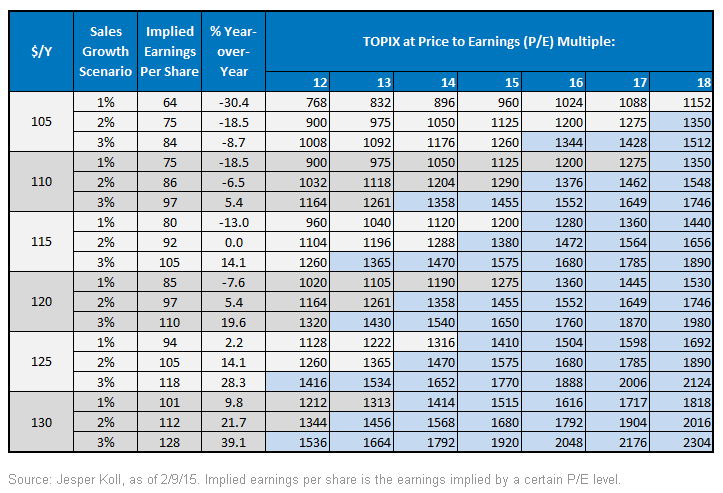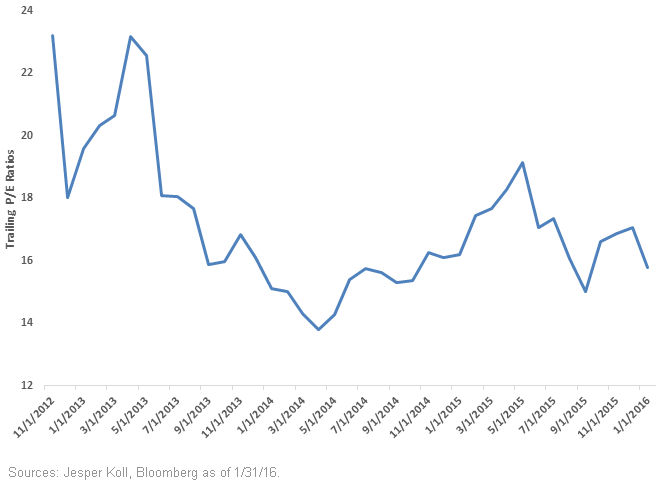The “crash test of
Abenomics” has entered the second stage, with the Japanese equity market downdraft compounded by sharp currency appreciation: The
TOPIX dropped back to the level seen on January 21, and the yen/U.S. dollar cross surged all the way up to 114.2,
1 a level not seen since November 2014. While we were right on Bank of Japan (BOJ) governor Haruhiko Kuroda’s determination to fight
deflation, we were wrong on global markets’ determination to force it. Whether encouraging fears of an imminent Chinese devaluation or exposing domestic deflation risks, clearly the BOJ’s new tool of negative
interest rates has proven ineffective to re-establish market confidence, at least so far in the game.
Where do we go from here? In our view, policy makers are unlikely to become complacent, and added reflation actions from both
monetary policy and
fiscal policy are poised to be presented. Here, predicting the timing is trickier than usual. Acting too soon could raise worries that policy makers have grown uncertain of their convictions—that is, they have tools but are not sure how to use them. In my personal view, it will be fiscal rather than monetary policy that will be eased next. Specifically, a delay in next year’s consumption tax hike or the commitment to compile an offsetting supplementary budget may be called for before long. Stay tuned for a more open battle between technocrats pushing for the tax hike for the sake of fiscal consolidation and Team Abe pushing for a delay for the sake of political capital, with both voters and markets worrying about a 2017 tax-hike-induced recession.
Valuation Reset
While politicians and technocrats will
fight over the next directional catalyst, Japanese equities will have to adjust to new realities on valuations. The current earnings season has brought a first drop in current-year
earnings per share (EPS) estimates (the Japanese fiscal year ends in March 2016). Specifically, current-year trailing TOPIX EPS has dropped from ¥94 to ¥90.
2 This was forced mainly by financials and trading companies, with the latter revising down due to lower commodity prices.
This leaves TOPIX now trading on 14.5x
trailing earnings. The good news is that this is still at the bottom end of the Abenomics range of tailing
price-to-earnings (P/E) valuations of 14x to 18x.
What about Forward-Looking Earnings?
Given that the two key forces driving corporate earnings in Japan are sales growth and currency, the market is right to worry that consensus earnings expectations for 2016–2017 are too optimistic. Below, we have constructed a simple matrix forecasting TOPIX EPS on various foreign exchange (FX) and sales growth assumptions, and then added P/E multiples for corresponding fair-value TOPIX targets.
Our baseline assumes an average FX rate of ¥115/$ and 2% sales growth. This would yield an EPS of 92, or zero EPS growth for the next fiscal year (April 2016 through March 2017). This contrasts with the consensus, which is calling for 9.8% EPS growth.
Note also that the current-year sales growth is likely to be around 2.7%,
3 so we have specifically lowered our baseline sales assumption to account for a global and domestic slowdown. If sales growth were to come to 3% instead of 2%, EPS would grow to 105, up 14.1%; if sales growth came to a mere 1%, EPS would drop to 80, down 13%.
Meanwhile, the implied EPS level for the various sales growth and FX assumptions is then multiplied by the P/E range of 12x to 18x; so, our base case of 2% sales growth and ¥115/$ corresponds to a TOPIX “fair value” of 1,472 at a 16x PE multiple. The yellow highlighted area is TOPIX levels above the February 9, 2016, close.
Double-digit earnings growth could be achieved even with ¥115/$, as long as sales growth runs at around 3% (our baseline of 2% sales growth yields zero earnings growth). Alternatively, if the currency weakens to ¥120/$, even just 2% sales growth yields 5.4% earnings growth. However, yen appreciation to ¥110/$ can only yield positive earnings growth if sales growth is around 3%.
While this is a busy table, the net result is that Japanese equities are still attractively valued—even on very conservative sales and FX assumptions, in our view.
At the same time, however, consensus earnings growth expectations are probably too high and likely will be revised down to about zero growth by the time of the full-year result releases, which are due in early to mid-May 2016.
TOPIX Earnings Scenarios with Different Sales Growth and FX Assumptions, and Implied Fair Value on Different P/E Multiples (for Next Fiscal Year, April 2016 to March 2017)
 Topix Trailing 12M P/E
Topix Trailing 12M P/E
 1
1Source: Bloomberg, as of 2/9/16.
2Source: Bloomberg.
3Source: Jesper Koll, as of 2/9/16.
Important Risks Related to this Article
The sources, opinions and forecasts expressed are as of February 9, 2016, and may not actually come to pass. This information is subject to change at any time based on market and other conditions and should not be construed as a recommendation of any specific security. Past performance is not indicative of future results.
Investments focused in Japan increase the impact of events and developments associated with the region, which can adversely affect performance.


 Topix Trailing 12M P/E
Topix Trailing 12M P/E
 1Source: Bloomberg, as of 2/9/16.
2Source: Bloomberg.
3Source: Jesper Koll, as of 2/9/16.
1Source: Bloomberg, as of 2/9/16.
2Source: Bloomberg.
3Source: Jesper Koll, as of 2/9/16.


